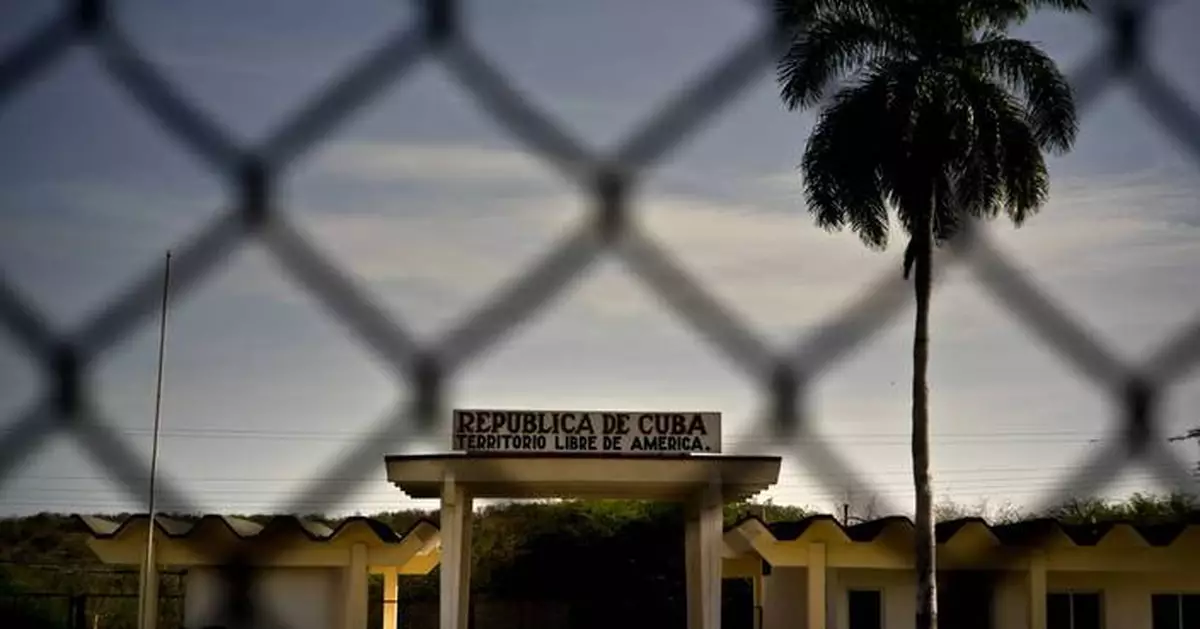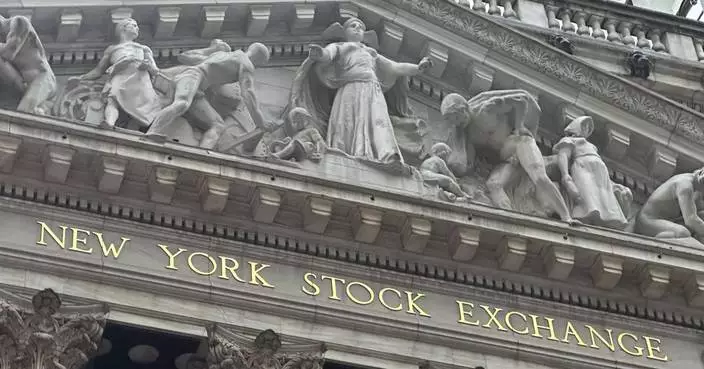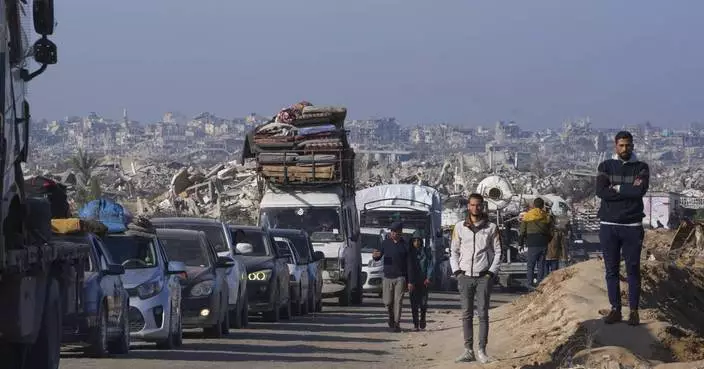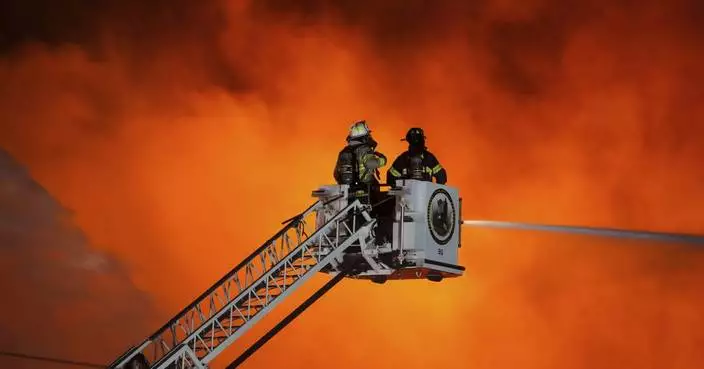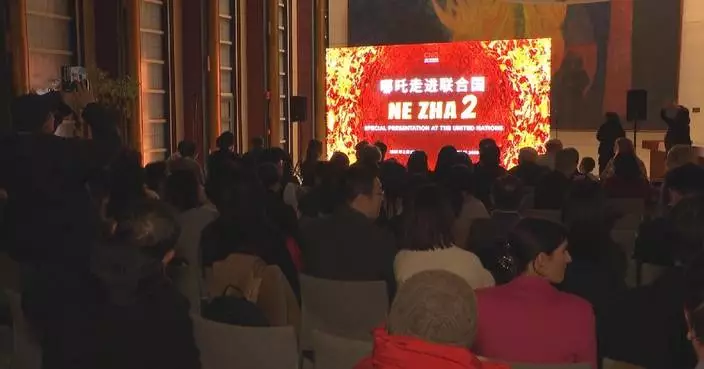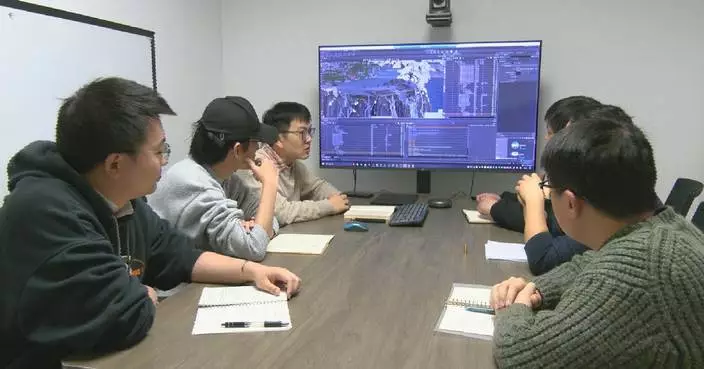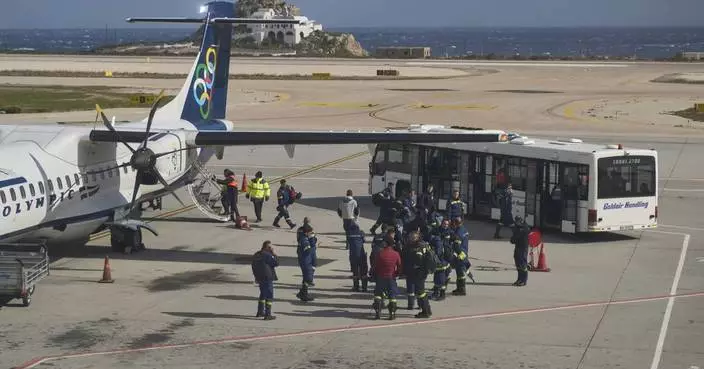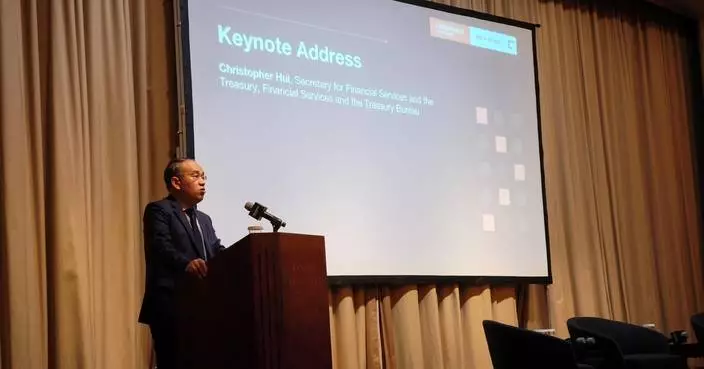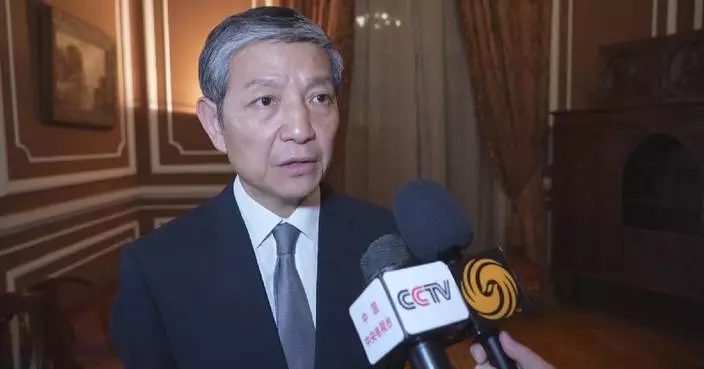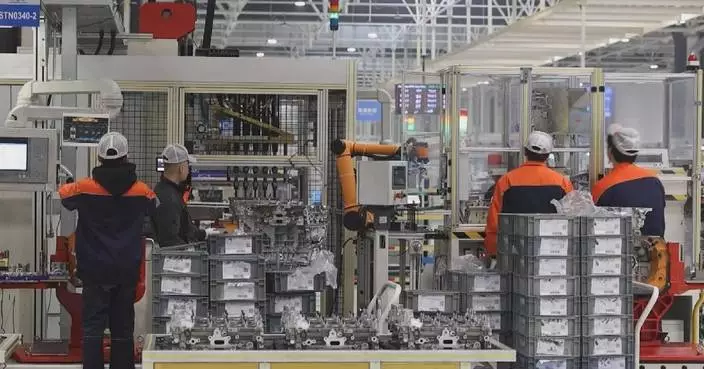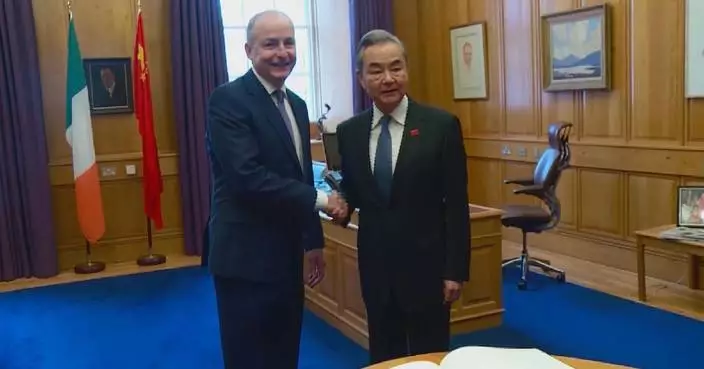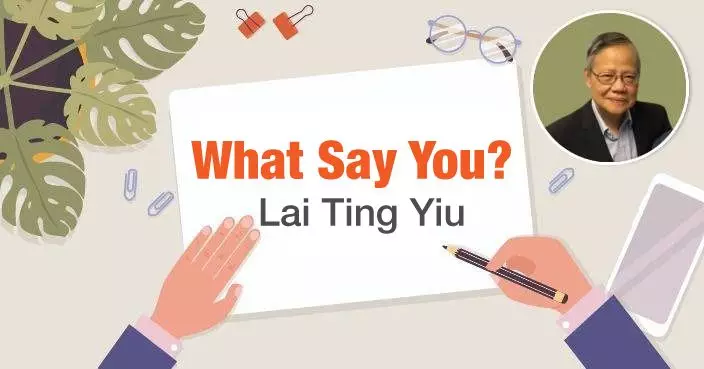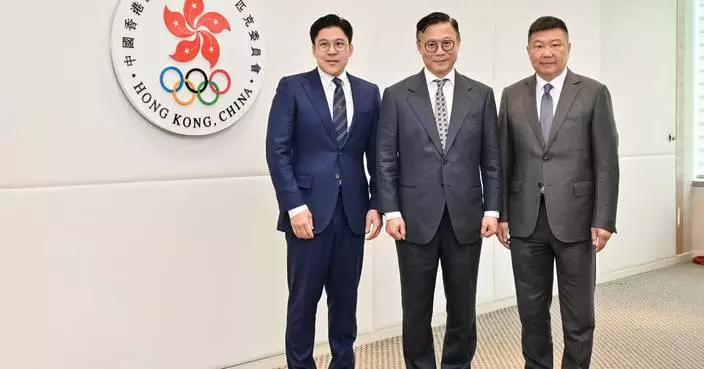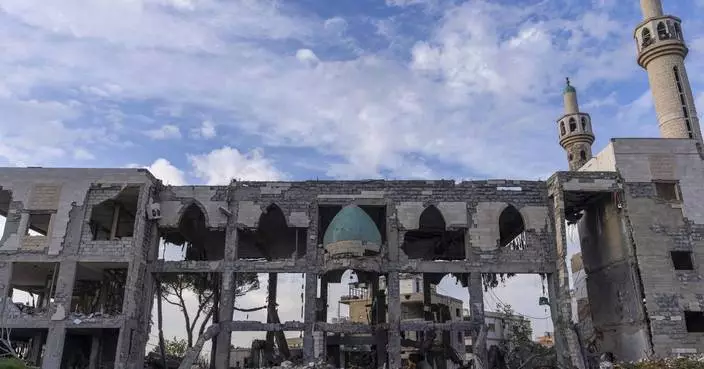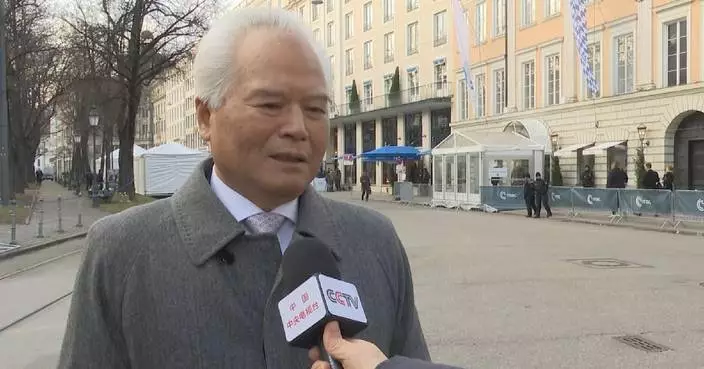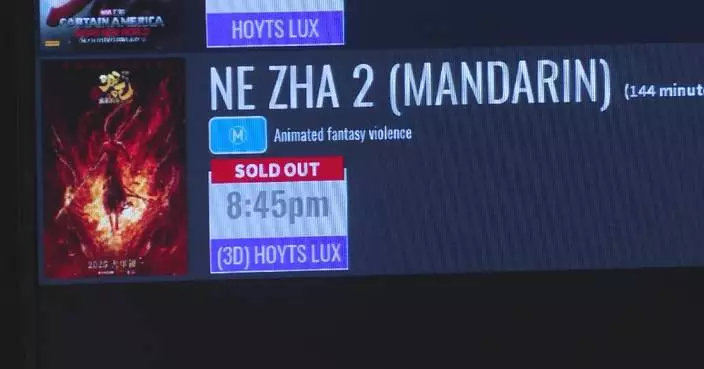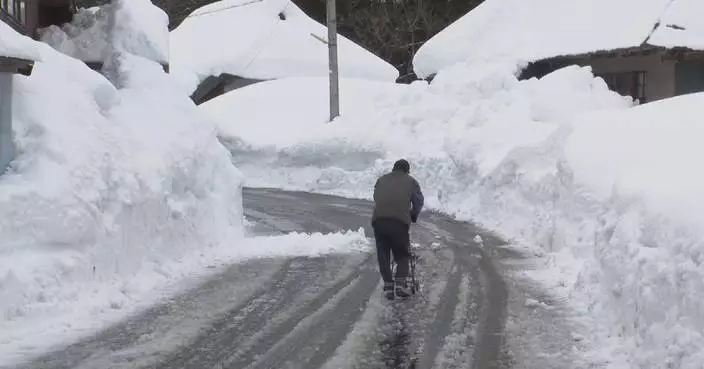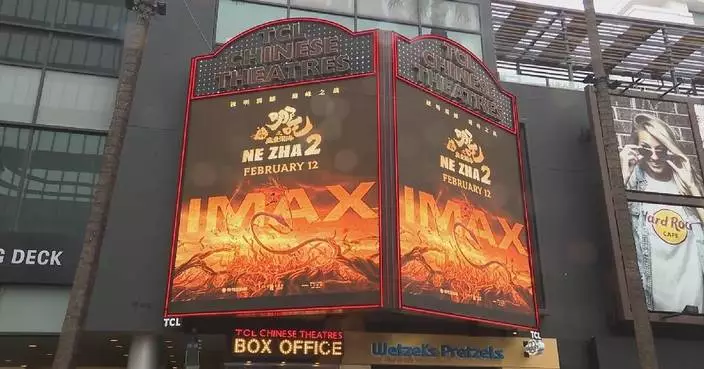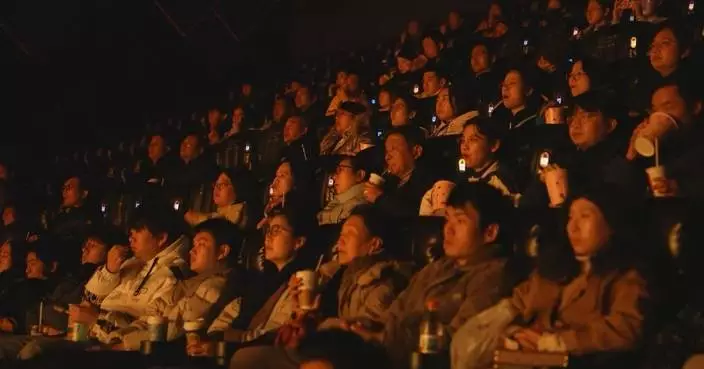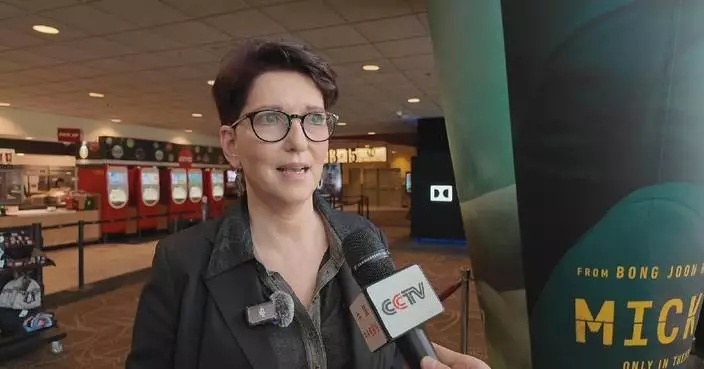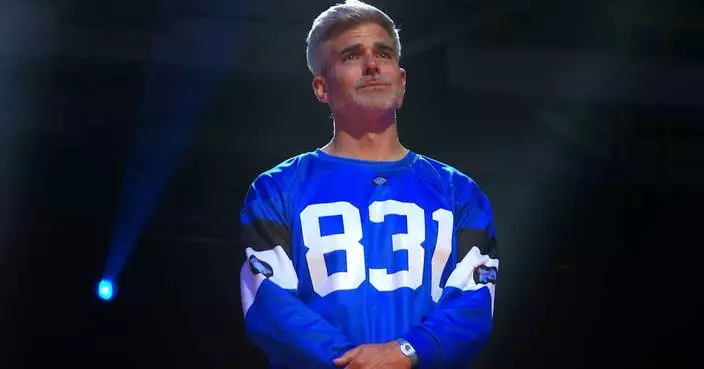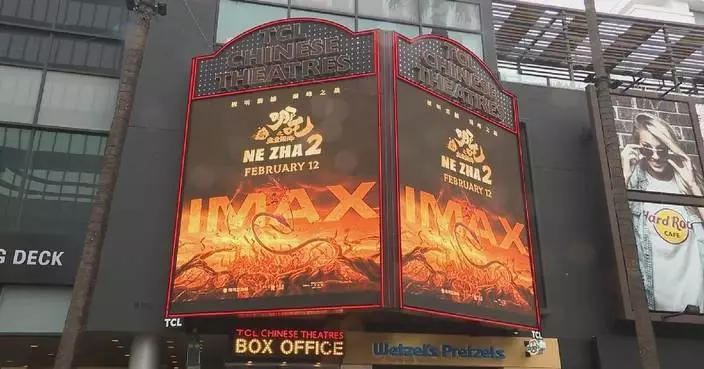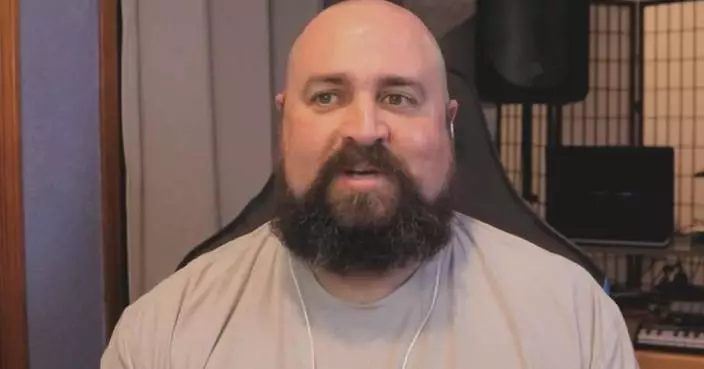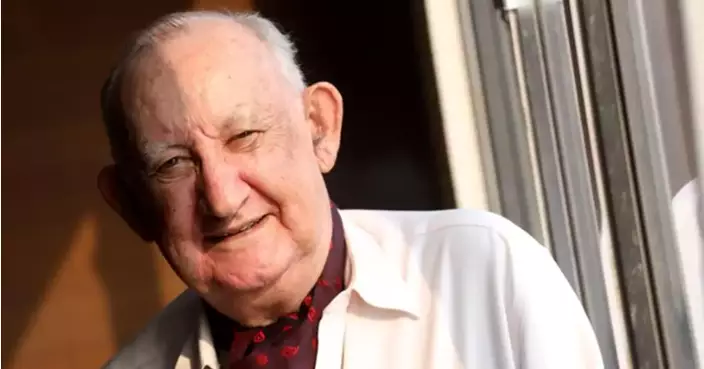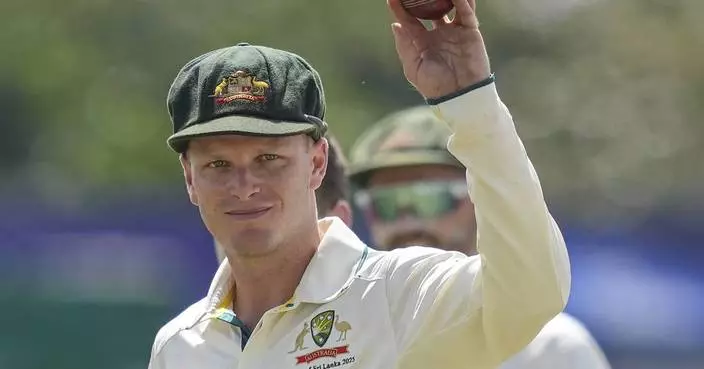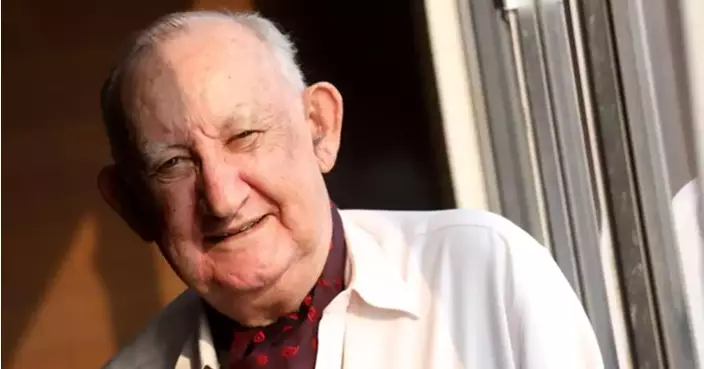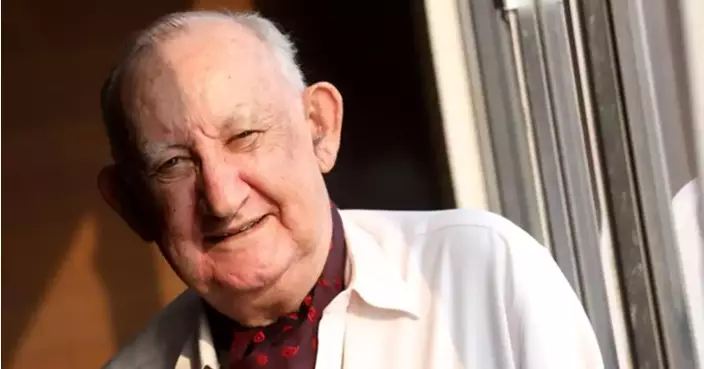President Donald Trump, who made the deportation of immigrants a central part of his campaign and presidency, said Wednesday that the U.S. will use a detention center at Guantánamo Bay, Cuba, to hold tens of thousands of the “worst criminal aliens.”
“We’re going to send them out to Guantánamo,” Trump said at the signing of the Laken Riley Act.
He later signed a presidential memorandum and said he’d direct federal officials to get facilities ready to receive criminal immigrants in the US illegally. Border czar Tom Homan said U.S. Immigration and Customs Enforcement would run the facility. Still, details of the plan weren't immediately clear.
Here's a look at the U.S. naval base, widely known as “Gitmo,” and its history:
While the U.S. naval base in Cuba is best known for the suspects brought in after the Sept. 11, 2001, attacks, it has a small, separate facility used for decades to hold migrants.
The Migrant Operations Center is used for people intercepted trying to illegally reach the U.S. by boat. Most are from Haiti and Cuba.
The center takes up a tiny part of the base, includes just a handful of buildings and has nowhere near the capacity to house the 30,000 people Trump said could be sent there.
"We're just going to expand upon that existing migrant center, Homan told reporters.
The migrant detention center operates separately from the military's detention center and courtrooms for foreigners detained under President George W. Bush during what that administration called its “war on terror.” That facility houses 15 detainees, including accused 9/11 mastermind Khalid Sheikh Mohammed. That's down from its peak of nearly 800.
The migrant detention facilities at Guantánamo will be used for “the worst of the worst,” administration officials said.
Homeland Security Secretary Kristi Noem and Homan both used the phrase when speaking to reporters outside the White House.
A White House statement was less specific, saying the expanded facility would “provide additional detention space for high-priority criminal aliens unlawfully present in the United States, and to address attendant immigration enforcement needs.”
An administration official, speaking on condition of anonymity because they weren’t authorized to speak publicly on the matter, said it would be used to house “dangerous criminals” and people who are “hard to deport.”
A number of countries refuse to accept some immigrants the U.S. tries to deport.
Trump has repeatedly spoken about the dangers Americans face from the estimated 11 million immigrants living in the U.S. illegally. While immigrants are regularly charged with committing major crimes, they are a tiny percentage of the overall population. Peer-reviewed academic studies have generally found no link between immigration and violent crime, though conclusions vary.
Not much. The nonprofit International Refugee Assistance Project said in a report last year that people are held in “prison-like” conditions. It said they were “trapped in a punitive system” indefinitely, with no accountability for the officials running it.
Deepa Alagesan, a senior supervising attorney with the group, said Wednesday that they believed it is used to hold a small number of people — “in the double digits,” she estimated.
The prospect of using it for far more immigrants worried her.
“It’s definitely a scary prospect,” she said.
Trump has vowed to deport millions of people living illegally in the U.S., but the current Immigration and Customs Enforcement budget only has enough funds to detain about 41,000 people.
ICE detains immigrants at its processing centers and privately operated detention facilities, along with local prisons and jails. It has no facilities geared toward the detention of families, who account for roughly one-third of arrivals on the southern U.S. border.
During Trump’s first term, he authorized the use of military bases to detain migrant children. In 2014, then-President Barack Obama temporarily relied on military bases to detain immigrant children while ramping up privately operated family detention centers to hold many of the tens of thousands of Central American families caught illegally crossing the border.
U.S. military bases have been used repeatedly since the 1970s to accommodate the resettlement of waves of immigrants fleeing Vietnam, Cuba, Haiti, Kosovo and Afghanistan.
The decision to send immigrants to Guantánamo “should horrify us all,” said a legal advocacy group that since the Sept. 11 attacks has represented dozens of men detained at the base.
Trump’s order “sends a clear message: migrants and asylum seekers are being cast as the new terrorist threat, deserving to be discarded in an island prison, removed from legal and social services and supports,” Vince Warren, the executive director of the New York-based Center for Constitutional Rights, said in a statement.
The U.S. has leased Guantánamo from Cuba for more than a century. Cuba opposes the lease and typically rejects the nominal U.S. rent payments.
Government officials criticized the news Wednesday, with President Miguel Díaz-Canel deeming the decision “an act of brutality” on X and describing the base as “located in illegally occupied #Cuba territory.”
Foreign Minister Bruno Rodríguez said on X, “The US government’s decision to imprison migrants at the Guantánamo Naval Base, in an enclave where it created torture and indefinite detention centers, shows contempt for the human condition and international law.”
Associated Press writers Rebecca Santana and Ellen Knickmeyer contributed from Washington.
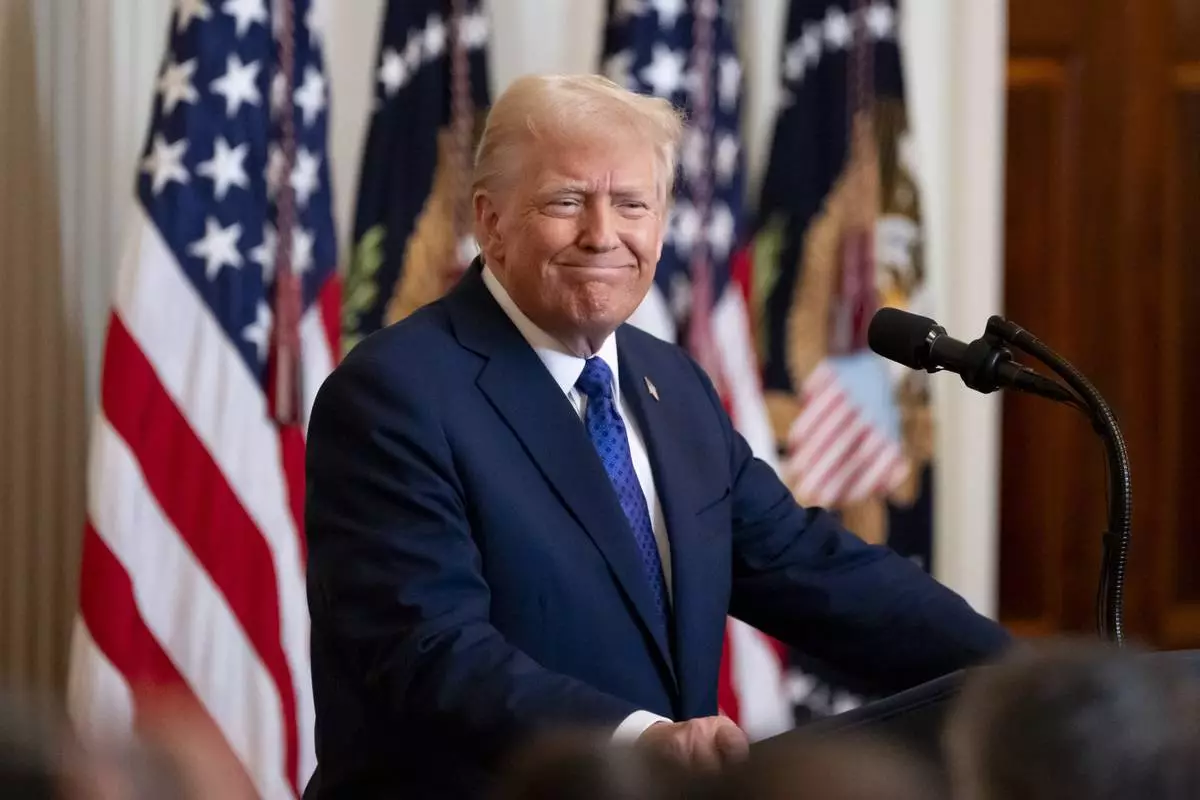
President Donald Trump pauses while speaking before signing the Laken Riley Act in the East Room of the White House, Wednesday, Jan. 29, 2025, in Washington. (AP Photo/Alex Brandon)
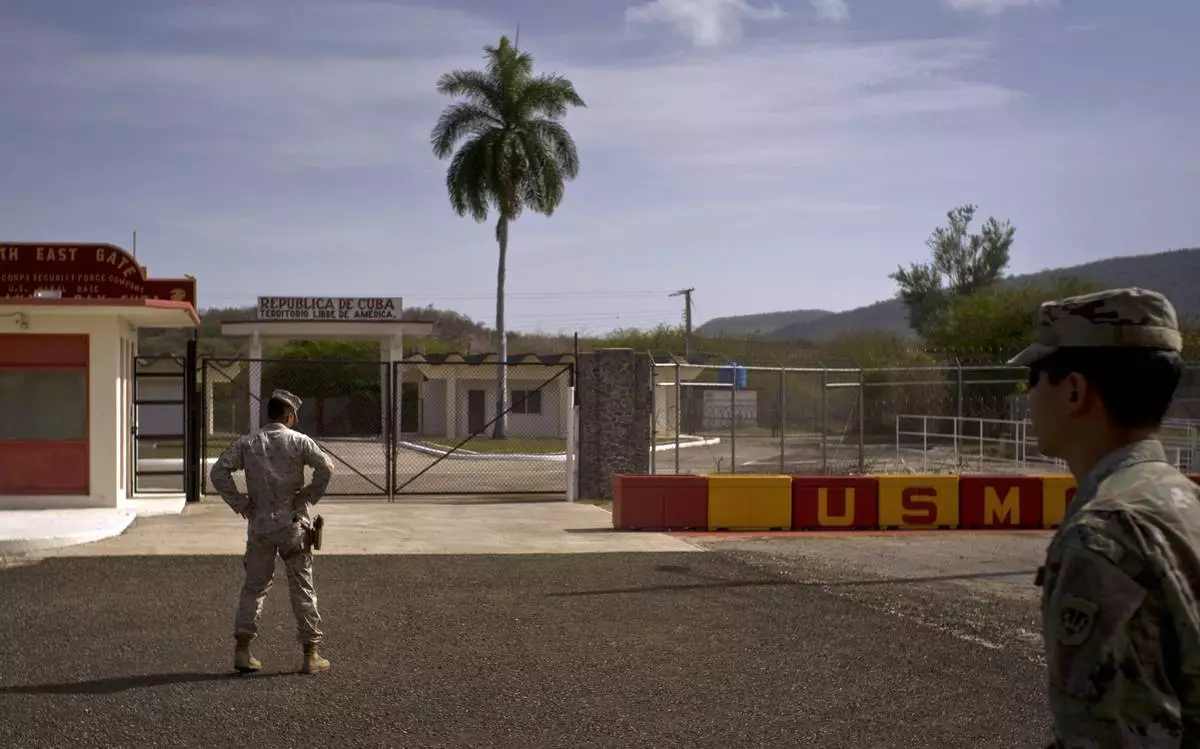
FILE - In this photo reviewed by U.S. military officials, an Army soldier, right, and a Marine stand in front of the gates that separate the Cuban side from the Guantanamo Bay U.S. Naval Base, June 6, 2018. (AP Photo/Ramon Espinosa, File)
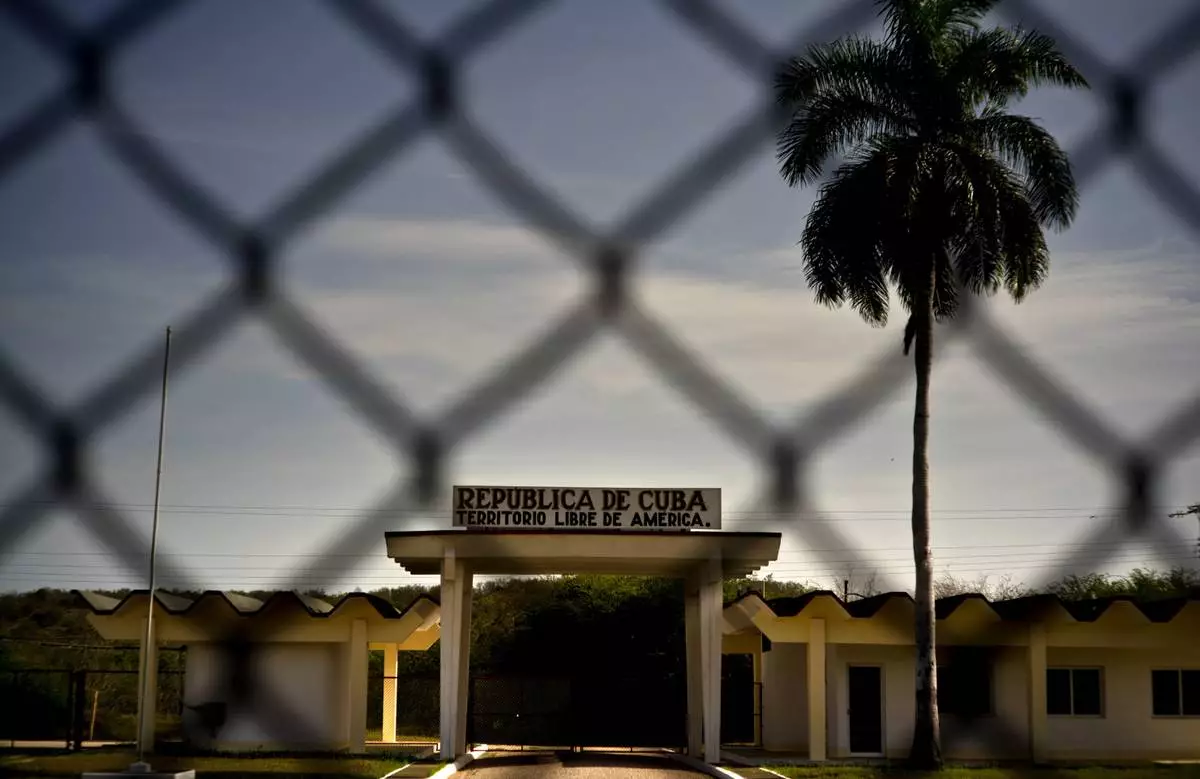
FILE - In this photo reviewed by U.S. military officials, a building in Cuba carries the Spanish message "Republic of Cuba. Free American Territory," behind a gate marking the border with the U.S. Guantanamo Bay naval base in Cuba, June 6, 2018. (AP Photo/Ramon Espinosa, File)
RIYADH, Saudi Arabia (AP) — Russia and the U.S. agreed Tuesday to start working towards ending the war in Ukraine and improving their diplomatic and economic ties, America's top diplomat said after talks that reflected an extraordinary about-face in U.S. foreign policy under President Donald Trump.
In an interview with The Associated Press, Secretary of State Marco Rubio said that the two side agreed broadly to pursue three goals: to restore staffing at their respective embassies in Washington and Moscow, to create a high-level team to support Ukraine peace talks, and to explore closer relations and economic cooperation.
He stressed, however, that the talks — which were also attended by his Russian counterpart, Sergey Lavrov — marked the beginning of a conversation, and more work needs to be done down the road.
No Ukrainian officials were present at the meeting, which came as the beleaguered country is slowly but steadily losing ground against more numerous Russian troops in a grinding war that began nearly three years ago.
President Volodymyr Zelenskyy said his country wouldn't accept any outcome from this week's talks since Kyiv wasn't taking part — and postponed his own trip scheduled for Wednesday.
European allies have also expressed concerns they are being sidelined.
Ties between Russia and the U.S. have fallen to their lowest level in decades during the war. Both embassies have been hit hard by expulsions of large numbers of diplomats over the course of several years, and the U.S., along with European nations, imposed a raft of sanctions on Russia. The allies have repeatedly expanded the measures to damage Moscow's economy.
“Should this conflict come to an acceptable end, the incredible opportunities that exist to partner with the Russians geopolitically on issues of common interest and frankly, economically on issues that hopefully will be good for the world and also improve our relations in the long term,” Rubio said.
His comments were further evidence of the remarkable U.S. reversal on Russia after years in which Trump’s predecessor, Joe Biden, led international efforts to isolate Moscow.
Tuesday's meeting was meant to pave the way for a summit between Trump and Russian President Vladimir Putin. After the talks wrapped, Putin’s foreign affairs advisor, Yuri Ushakov, told Russia’s Channel One that no date has been set yet for that summit but that it was “unlikely” to take place next week.
Speaking to reporters after the meeting, Lavrov said that in his view, “the conversation was very useful.” He mentioned the same three goals as Rubio and said that Washington and Moscow agreed to appoint representatives to carry out “regular consultations” on Ukraine.
“We not only listened, but also heard each other," Lavrov. "And I have reason to believe that the American side has started to better understand our position, which we have once again outlined in detail, using specific examples, based on President Putin’s repeated speeches.”
The meeting marked the most extensive contact between the two countries since Moscow’s Feb. 24, 2022, invasion. Lavrov and then-U.S. Secretary of State Antony Blinken talked briefly on the sidelines of a G-20 meeting in India nearly two years ago, but tensions remained high.
The recent U.S. diplomatic blitz on the war has sent Ukraine and key allies scrambling to ensure a seat at the table amid concerns that Washington and Moscow could press ahead with a deal that won’t be favorable to them.
Kyiv's absence at Tuesday's talks has rankled many Ukrainians, and France called an emergency meeting of European Union countries and the U.K. on Monday to discuss the war. Kyiv’s participation in such talks was a bedrock of U.S. policy under Biden, whose administration also led international efforts to isolate Russia over the war.
Rubio said Tuesday that ending the conflict would require concessions from all sides and that Europe would be a part of talks.
In talking about sanctions against Russia, Rubio noted that the measures have come from the U.S.'s allies as well.
“The European Union is going to have to be at the table at some point because they have sanctions as well that have been imposed,” he said.
French President Emmanuel Macron on Tuesday said he spoke by phone to Trump and Zelenskyy following Monday's European meeting.
“We seek a strong and lasting peace in Ukraine,” Macron wrote on social media platform X. “To achieve this, Russia must end its aggression, and this must be accompanied by strong and credible security guarantees for the Ukrainians,” he said and vowed to “work on this together with all Europeans, Americans, and Ukrainians.”
Peskov on Tuesday said that Putin has repeatedly expressed readiness for peace talks, and noted that a durable settlement of the conflict in Ukraine would be impossible without “a comprehensive consideration of security issues” in Europe.
The meeting at the Diriyah Palace in the Saudi capital of Riyadh also highlights de facto leader Crown Prince Mohammed bin Salman’s efforts to be a major diplomatic player, burnishing a reputation severely tarnished by the 2018 killing of Washington Post journalist Jamal Khashoggi.
Saudi state media described the talks as happening at the prince’s direction. Like the neighboring United Arab Emirates, the prince has maintained close relations to Russia throughout its war on Ukraine, both through the OPEC+ oil cartel and diplomatically as well.
Saudi Arabia has also helped in prisoner negotiations and hosted Zelenskyy for an Arab League summit in 2023.
Zelenskyy postponed his own trip to Saudi Arabia scheduled for this week, citing the fact that officials from his country were not invited to the talks. He suggested he wanted to avoid his visit being linked to them. He said his visit was rescheduled for March 10.
Rubio was accompanied by U.S. national security adviser Mike Waltz and special envoy Steve Witkoff, while Lavrov sat next to Ushakov. Saudi Foreign Minister Faisal bin Farhan and national security adviser Musaed al Alban joined Rubio, Lavrov and others for the start of the meeting.
Meanwhile, Russia continued to pummel Ukraine with drones, according to Kyiv's military. The Ukrainian air force said Russian troops launched a barrage of 176 drones at Ukraine overnight, most of which were destroyed or disabled by jamming.
One Russian drone struck a residential building in Dolynska in the Kirovohrad region, wounding a mother and her two children and prompting an evacuation of 38 apartments, the regional administration reported. Four more residential buildings were damaged by drone debris in the Cherkasy region of Ukraine, according to local officials.
Litvinova reported from Tallinn, Estonia. Associated Press writers Baraa Anwer in Riyadh, Saudi Arabia, Jon Gambrell in Dubai, United Arab Emirates, Illia Novikov in Kyiv, Ukraine, and Sylvie Corbet in Paris contributed to this report.
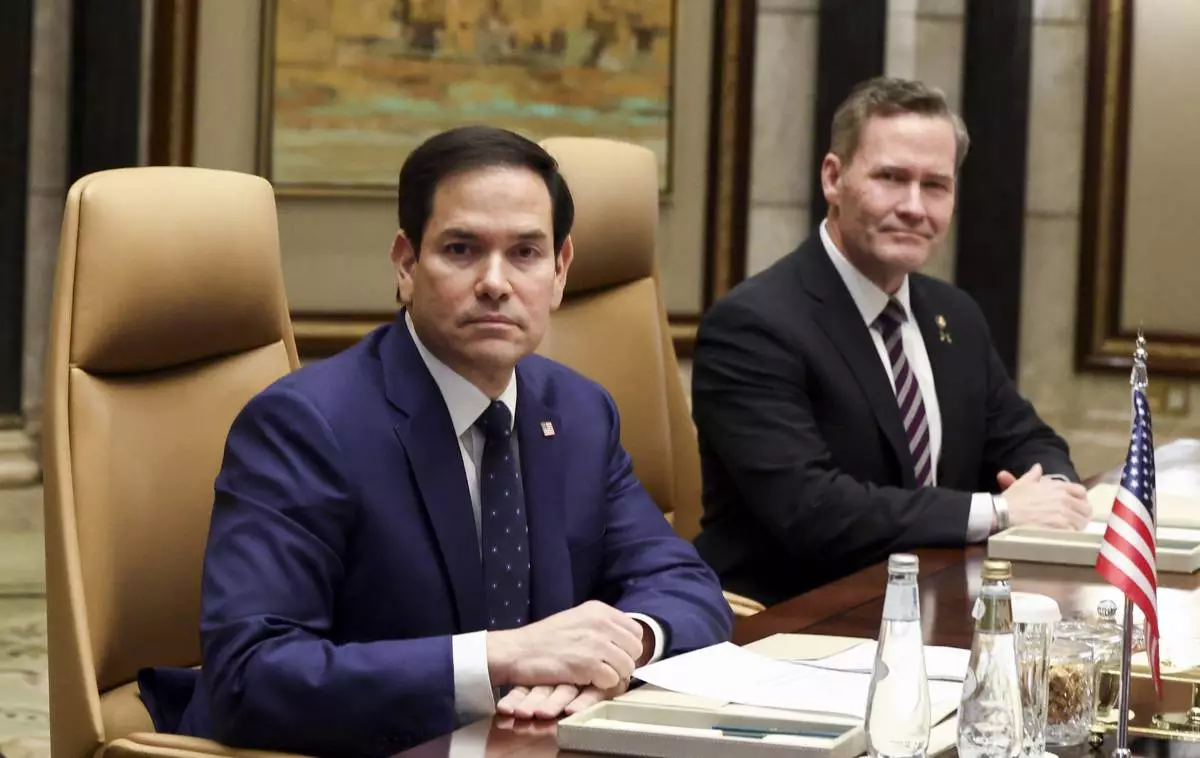
U.S. Secretary of State Marco Rubio, center, sits next to U.S. National Security Advisor Mike Waltz during a meeting with Saudi Foreign Minister Prince Faisal bin Farhan Al Saud, Saudi National Security Advisor Mosaad bin Mohammad Al-Aiban, Russian Foreign Minister Sergei Lavrov and Russian President Vladimir Putin's foreign policy advisor Yuri Ushakov, at Diriyah Palace, in Riyadh, Saudi Arabia, Tuesday, Feb. 18, 2025. (Evelyn Hockstein/Pool Photo via AP)
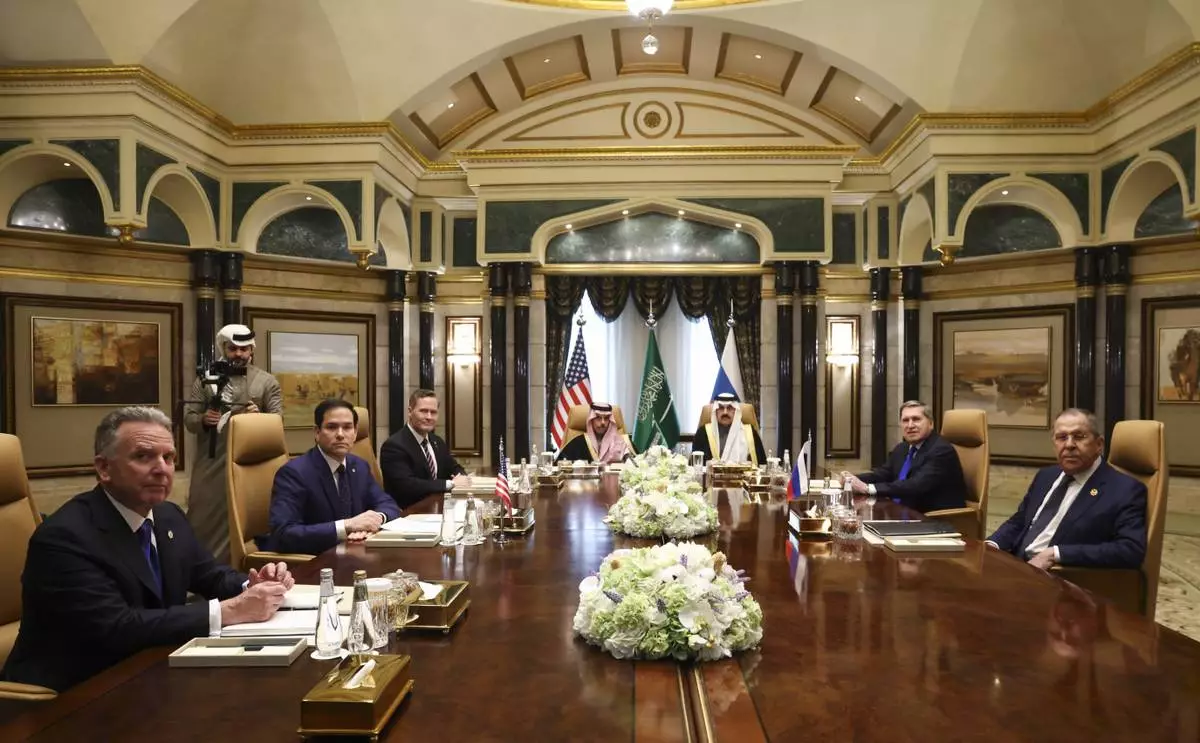
U.S. Secretary of State Marco Rubio, second left, meets with Saudi Foreign Minister Prince Faisal bin Farhan Al Saud, Saudi National Security Advisor Mosaad bin Mohammad Al-Aiban, U.S. National Security Advisor Mike Waltz, third left, U.S. Middle East envoy Steve Witkoff, left, Russian Foreign Minister Sergei Lavrov, right, and Russian President Vladimir Putin's foreign policy advisor Yuri Ushakov, second right, at Diriyah Palace, in Riyadh, Saudi Arabia, Tuesday Feb. 18, 2025. (Evelyn Hockstein/Pool Photo via AP)
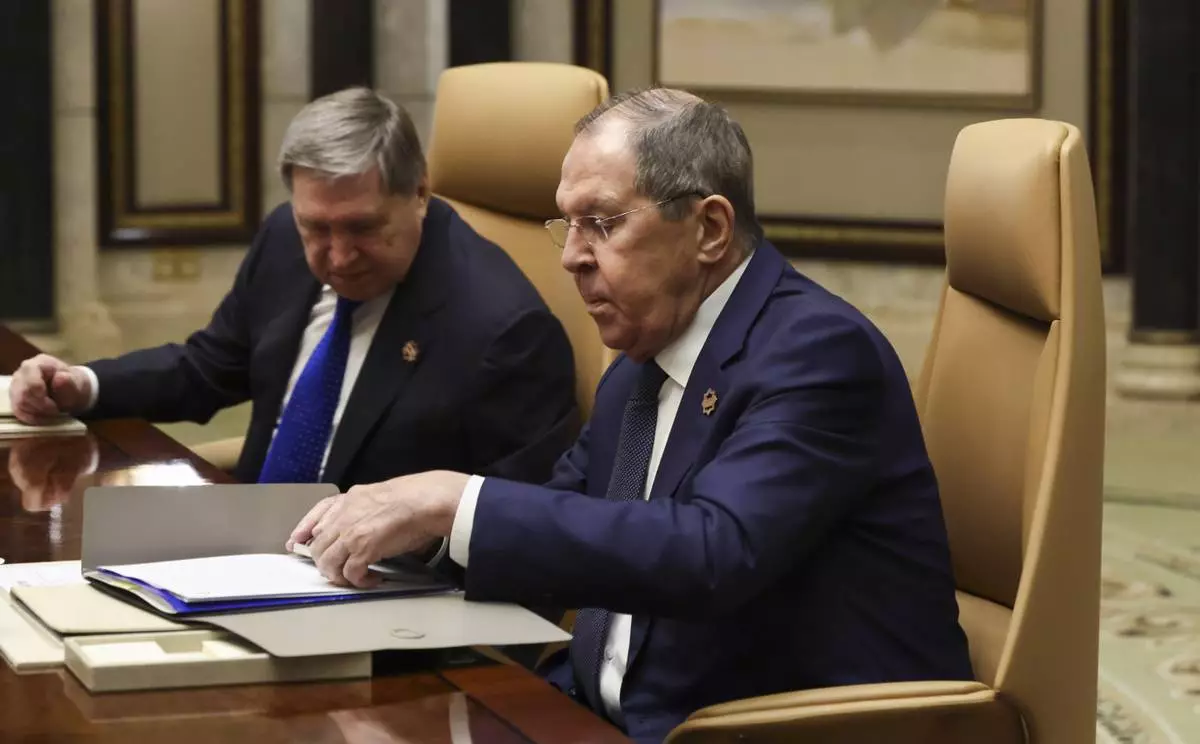
Russian Foreign Minister Sergei Lavrov, right, sits next to Russian President Vladimir Putin's foreign policy advisor Yuri Ushakov during a meeting with U.S. Secretary of State Marco Rubio, U.S. National Security Advisor Mike Waltz and U.S. Middle East envoy Steve Witkoff, Saudi Foreign Minister Prince Faisal bin Farhan Al Saud and Saudi National Security Advisor Mosaad bin Mohammad Al-Aiban, at Diriyah Palace, in Riyadh, Saudi Arabia, Tuesday, Feb. 18, 2025. (Evelyn Hockstein/Pool Photo via AP)
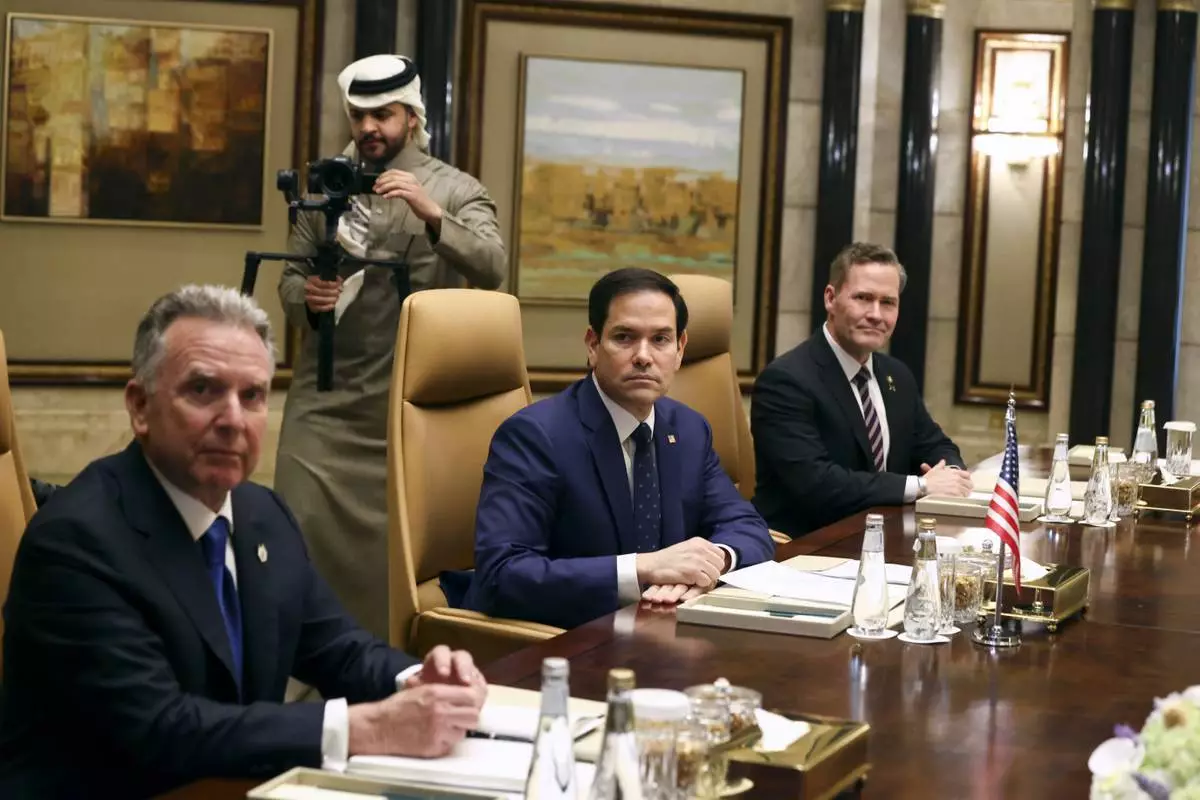
U.S. Secretary of State Marco Rubio, center, sits next to U.S. National Security Advisor Mike Waltz, right, and U.S. Middle East envoy Steve Witkoff during a meeting with Saudi Foreign Minister Prince Faisal bin Farhan Al Saud, Saudi National Security Advisor Mosaad bin Mohammad Al-Aiban, Russian Foreign Minister Sergei Lavrov and Russian President Vladimir Putin's foreign policy advisor Yuri Ushakov, at Diriyah Palace, in Riyadh, Saudi Arabia, Tuesday, Feb. 18, 2025. (Evelyn Hockstein/Pool Photo via AP)
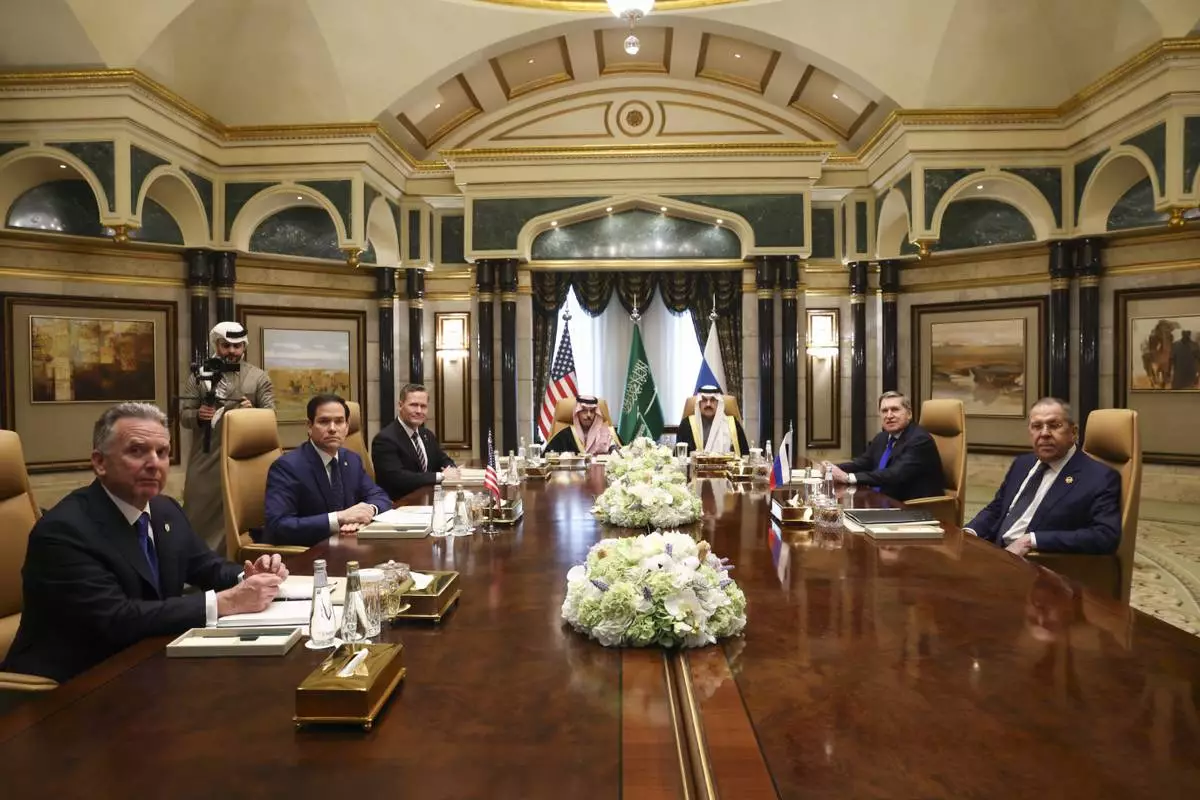
U.S. Secretary of State Marco Rubio, second left, meets with Saudi Foreign Minister Prince Faisal bin Farhan Al Saud, Saudi National Security Advisor Mosaad bin Mohammad Al-Aiban, U.S. National Security Advisor Mike Waltz, U.S. Middle East envoy Steve Witkoff, Russian Foreign Minister Sergei Lavrov, right, and Russian President Vladimir Putin's foreign policy advisor Yuri Ushakov, at Diriyah Palace, in Riyadh, Saudi Arabia, Tuesday Feb. 18, 2025. (Evelyn Hockstein/Pool Photo via AP)
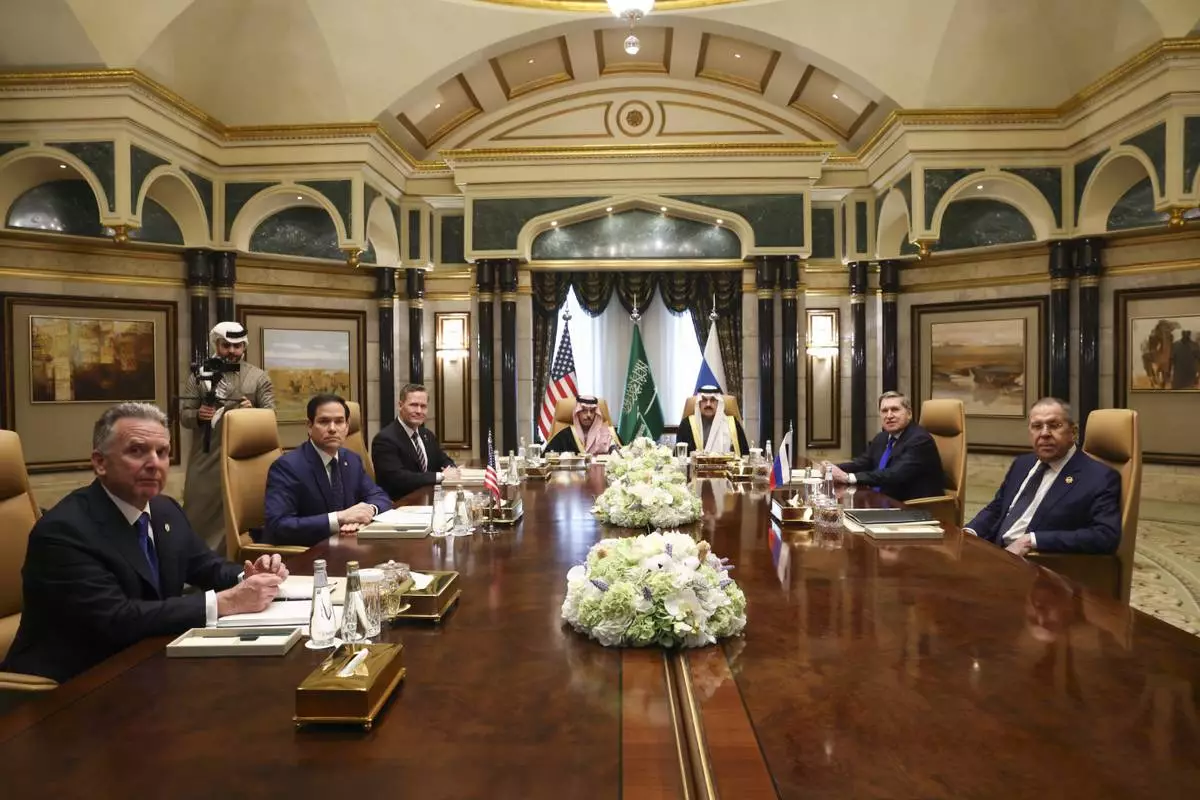
U.S. Secretary of State Marco Rubio, second left, meets with Saudi Foreign Minister Prince Faisal bin Farhan Al Saud, Saudi National Security Advisor Mosaad bin Mohammad Al-Aiban, U.S. National Security Advisor Mike Waltz, U.S. Middle East envoy Steve Witkoff, Russian Foreign Minister Sergei Lavrov, right, and Russian President Vladimir Putin's foreign policy advisor Yuri Ushakov, at Diriyah Palace, in Riyadh, Saudi Arabia, Tuesday Feb. 18, 2025. (Evelyn Hockstein/Pool Photo via AP)

CORRECTS THE IDENTITY OF PERSON ON LEFT - Kirill Dmitriev, the head of the Russian Direct Investment Fund, right, walks with an unidentified member of his team across the Ritz Carlton hotel in Riyadh, Saudi Arabia, Tuesday, Feb. 18, 2025. (AP Photo/Baraa Anwer)
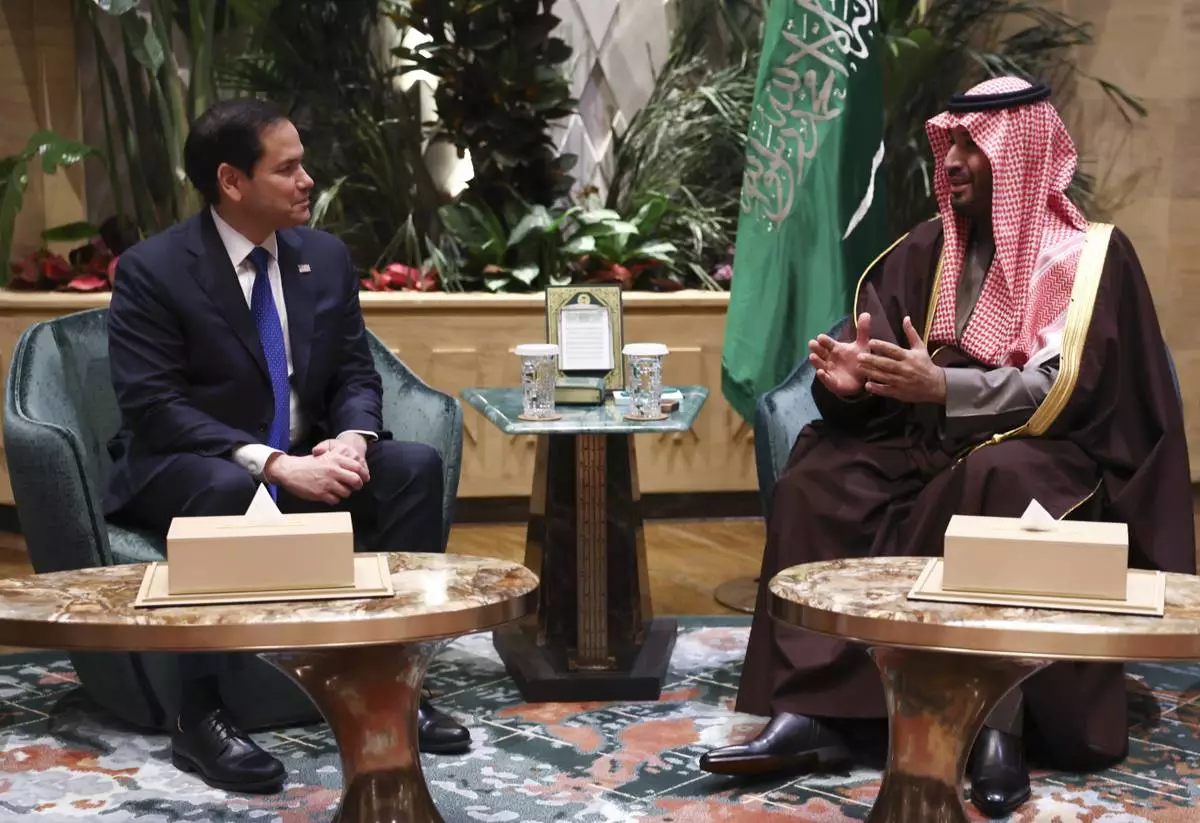
U.S. Secretary of State Marco Rubio, left, meets with Saudi Arabia's Crown Prince Mohammed bin Salman, right, in Riyadh, Saudi Arabia, Monday Feb. 17, 2025. (Evelyn Hockstein/Pool Photo via AP)
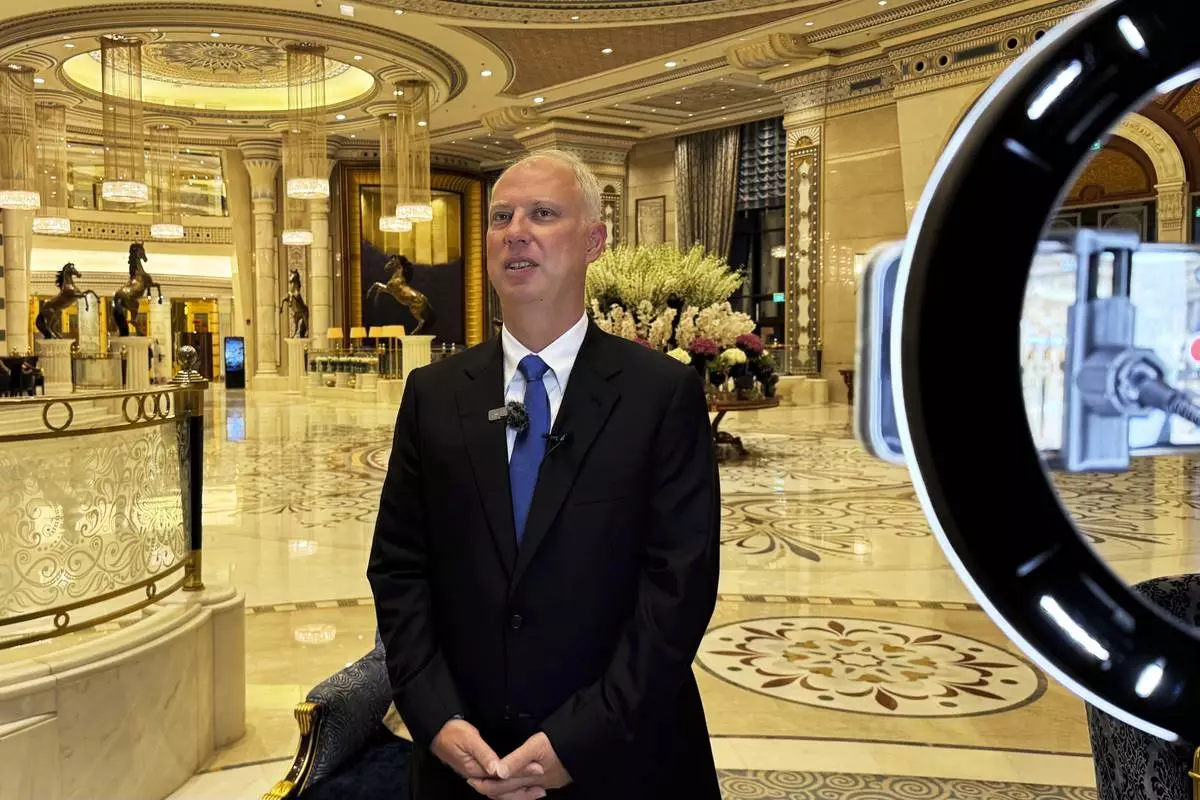
Kirill Dmitriev, the head of the Russian Direct Investment Fund, speaks to journalists at the Ritz Carlton hotel in Riyadh, Saudi Arabia, Tuesday, Feb. 18, 2025. (AP Photo/Baraa Anwer)
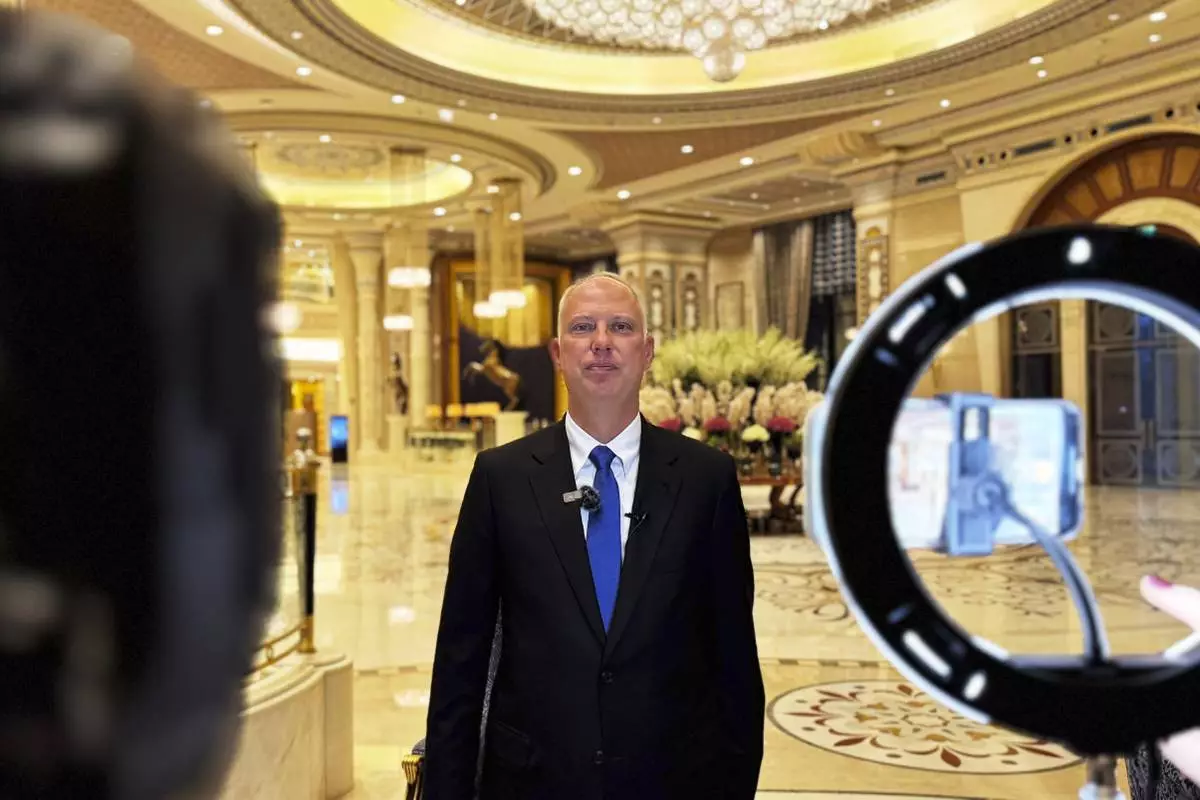
Kirill Dmitriev, the head of the Russian Direct Investment Fund, speaks to journalists at the Ritz Carlton hotel in Riyadh, Saudi Arabia, Tuesday, Feb. 18, 2025. (AP Photo/Baraa Anwer)
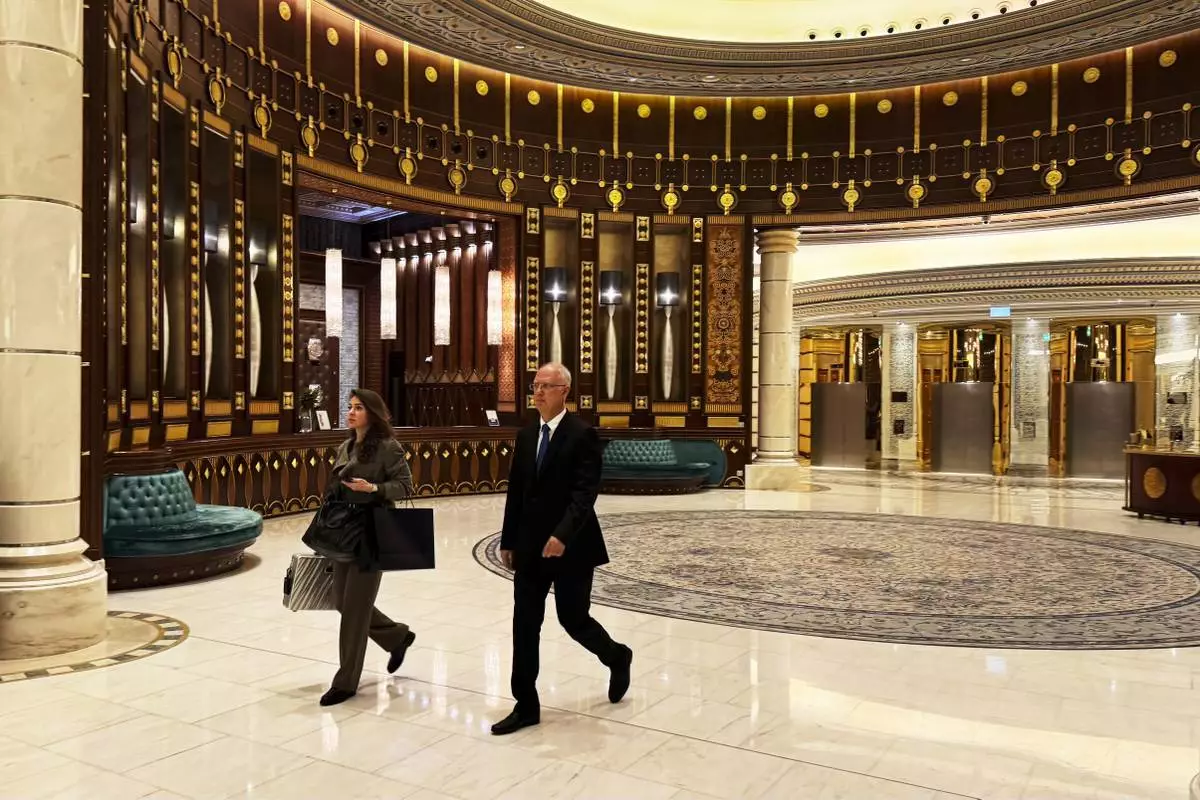
Kirill Dmitriev, the head of the Russian Direct Investment Fund, right, and Maria Medvedeva, the deputy CEO for external communication for the fund, walk across the Ritz Carlton hotel in Riyadh, Saudi Arabia, Tuesday, Feb. 18, 2025. (AP Photo/Baraa Anwer)





